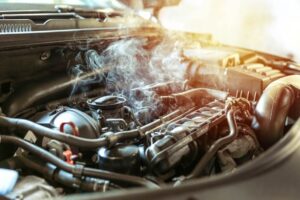Imagine this scenario: you are seated comfortably on your car, waiting at a red light, quietly enjoying your favourite music, when all at once the engine starts sputtering and eventually conks out! The vehicle comes to a halt right in the middle of the road. How irritating, right? Stalling can be much more than a mere inconvenience; more often than not, it is also a symptom of other problems that need to be addressed.
No matter how many miles you have on your odometer or how green you are on the road, getting surprised by a stalling vehicle is something most drivers will witness and wish they didn’t. But don’t worry! Knowing the reasons that may lead your automobile to stall when it is stationary can help you do things that will allow you to get the vehicle running again without breaking a sweat. Let’s see what could be the root of your car problems and how you can face all of them straight!
Factors That Lead Cars to Stall:
Car stalling can be quite stress-inducing, particularly where you are simply running to beat the deadline. The case of a dirty idle air control valve is one such. This device controls air that is maintained at rest. If it goes bad, the engine will not be able to hold up idle for reasons well known.
Another cause could be a clogged fuel filter. If the filter too gets blocked with dirt, then fuel supply is restricted completely. What happens in this case is that the supply of gasoline into the engine is not in uniform proportion.
Spark plugs are also fairly important. A ruined spark plug normally result to stalling or frequent misfiring of the engine while idling. They also need servicing.
Defects within the battery and alternator should also not be neglected. With a low power supply, a number of systems in your car are also affected and you can even experience stalling when the vehicle is moving at low speed or when at a stop.
Determining the Problem: What to Do?
To begin with, look closely at the stalling pattern. Make sure to log when it occurs—if it occurs at the stop sign lights’ or during periods of idleness or even after the engine has just been started. This will help give ideas on what you need to work on.
Then, look for warning lights on the vehicle dashboard. The engine will be turned on and the check engine light is still off, which means the problems in question still exist.
Hear the sounds made by your running engine; be attentive. If the idle is not constant, an abnormal diagnosis can be attributed to either fuel or air intake concerns.
Check very simple items such as the battery and its cables. A random dull rattling noise for example, may likely be caused by dismantled cables and cause stalling.
Last but not least, pay attention to your fuel quantity or fuel quality. It might not be faulty fuel only that is present. Maybe it could also just be the fuel is too little.
Take into consideration factors such as climatic changes, which also contribute to how it performs. It is also important to monitor the external modification of this performance.
Stall Cars: Take Note Of the Following Points DIY Processes
Before you take it to a specialist for repairs, there are a few things you can do on your own if you notice that the car starts stalling when being parked or idling. First, look for the air filter. If there is a lot of dirt in the filter, the engine gets inadequate air supply, which can induce stalling. Then there is the fuel trim. The fuel injectors might be unable to spray the necessary gasoline effectively. This problem can be addressed with good-quality washing fluid. Another usual suspect is an idle air control valve (IAC) that frequently gets contaminated as well. Perhaps cleaning it or replacing it will help with the idling problem.
You should not ignore the spark plugs either, as they also do not function properly, leading to erratic operation of the engine. You may just find some that are already worn out and change them with new ones. Check the battery terminals and ground wires for any traces of rust. Sometimes stalling problems may be caused by poor electrical contact. These steps involve using very simple tools and are quite helpful in helping you solve car troubles at home without spending a fortune.
When to Seek Professional Help?
It is important to know when to fix a stalling car on your own and when to look for help. If your DIY efforts have not helped a bit, especially with the mechanical aspect of it, don’t be afraid to call upon an expert. Strange sounds coupled with warning signs can heavily indicate that there are other underlying issues that need more knowledge and tools to fix. Otherwise, this may lead to more destruction with time, and the situation may worsen.
When it comes to cars, they also have it the same way; frequent stalling even after numerous adjustments suggests possible problems, which requires a well-equipped mechanic. It is time to find an expert who will be able to rectify the problem, for if it happens more than twice, you will be encountering much frustration. They will be able to carry out an in-depth diagnosis of the situation at hand as they will be equipped with advanced diagnostic machines and previous or similar experiences.
Preventative Measures to Avoid Future Stalling:
- It goes without saying that you need to avoid situations where stalling will occur. Make it a point to plan. Doing so will focus as well on preventive maintenance.
- In the first place, if the status of the fuel system is relatively clean, stalling may also be avoided. In addition to that, do not skimp on quality fuel and buy an injector cleaner from time to time. A well-maintained engine will always be efficient.
- Always remain cognisant of signs that alert you on the dashboard, primarily the check engine. Disregarding such alerts might lead to greater consequences in the future.
- Also watch for the oil levels, especially in the sump, because too low or too dirty oil can hamper motor performance.
- Observe your usage of the vehicle. Gradual and smooth application and releasing of the accelerator will allow for almost perfect idle conditions drawn out over a longer period, thus helping to reduce strain on your vehicle’s parts over time.
Conclusion:
Stalling is indeed a nuisance and can be quite adverse. Know the brakes to be able to manage your car’s driving ability. Adherence to the maintenance schedule is crucial. For some, a little finesse is required in order to intercept problems before they materialise. If there are parts that are difficult, ask for assistance and do not be ashamed to do this. You might forget some things, and for this reason, never assume that nothing is going to get fixed.
Above all things, ensure your safety while diagnosing or repairing the car. Why risk causing even more damage? Everybody knows that every car has its own peculiarities. Getting to know your own car will make it easier to hunt for problems in the future. Keep learning, keep acting, and be prepared for a more leisurely course!
FAQs:
1. What is the reason for a car that has stalled when just idling?
There are many complications leading to stalling at idle. These may include fuel issues such as a clogged filter, problems regulating air flow, or ignition channel components that may be faulty. The diagnosis of the particular issue is essential for the correct repair.
2. How can I determine that my fuel filter is clogged?
If your car stalls to start, suffers poor acceleration, or starts stalling, especially at idling, these symptoms may be a sign of a blocked fuel filter. This can be properly checked visually or through a professional.
3. Does a clogged spark plug have the potential to cause stalling?
Yes. If spark plugs are either dirty or worn out, the combustion in the engine will be compromised. Proper maintenance and, when necessary, timely replacements are required to prevent such problems.
4. Is it safe to drive a car even if it stalls?
The use of a vehicle that hesitates to drive is a danger not only to you but also to the other people who use the road. It is advisable to fix the problem prior to it being more than just persistent stalling.
5. What is the periodicity of performing maintenance work on my car?
Any routine inspections every 3000-5000 miles (or whatever distance is stated by your manufacturer) are important to keep all systems operational and to look for initial signs of possible problems in the future that can grow into severe ones.




